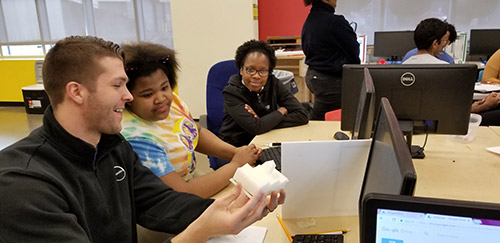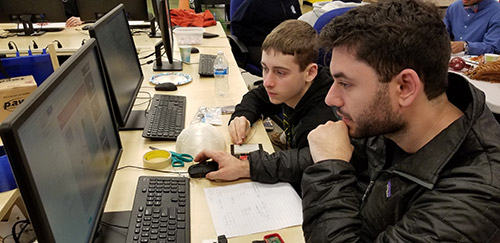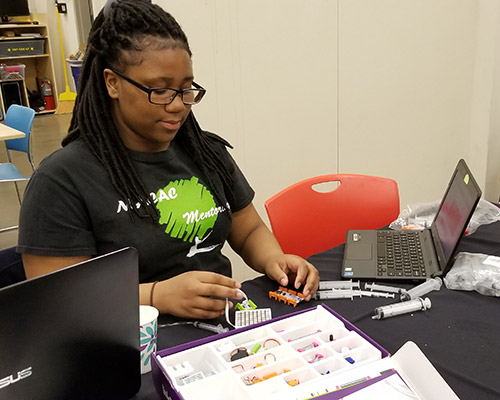 The Mentors in the Making program is a 1:1 mentoring program at BNY Mellon Fab Lab Carnegie Science Center for youth ages 14-18 from low-income families in the Pittsburgh area. The program was started in 2017 because, although the Mobile Fab Lab brings digital fabrication experiences to hundreds of students in their classrooms, there was a need for students to explore “making” inside the Fab Lab space over a longer period of time. Through Mentors in the Making, students learn digital fabrication and design alongside their mentors during weekly sessions that take place both online and in person, alternating every other week throughout the school year. Virtual sessions focus on digital design, and sessions in person emphasize hands-on making using Fab Lab equipment. Together, students and mentors engage in the Engineering Design Process to work on complex projects. As students lead projects, mentors model skills such as problem-solving, collaboration, and communication. As STEM professionals, mentors also offer their guidance and perspectives regarding school and career choices.
The Mentors in the Making program is a 1:1 mentoring program at BNY Mellon Fab Lab Carnegie Science Center for youth ages 14-18 from low-income families in the Pittsburgh area. The program was started in 2017 because, although the Mobile Fab Lab brings digital fabrication experiences to hundreds of students in their classrooms, there was a need for students to explore “making” inside the Fab Lab space over a longer period of time. Through Mentors in the Making, students learn digital fabrication and design alongside their mentors during weekly sessions that take place both online and in person, alternating every other week throughout the school year. Virtual sessions focus on digital design, and sessions in person emphasize hands-on making using Fab Lab equipment. Together, students and mentors engage in the Engineering Design Process to work on complex projects. As students lead projects, mentors model skills such as problem-solving, collaboration, and communication. As STEM professionals, mentors also offer their guidance and perspectives regarding school and career choices.
PROGRAM DESCRIPTION
During the Mentors in the Making program, students are matched with an adult STEM professional, and the pairs co-learn digital fabrication technologies, software, and design skills led by Fab Lab Education Facilitators. The pairs meet weekly in the Fab Lab and online to work through digital fabrication projects including 3D printing, laser cutting, and electronics. Students are provided with all necessary materials, transportation, and a laptop to ensure equitable access to virtual sessions. During the first phase of the program, mentoring pairs design digital projects during virtual sessions and earn certification on CNC machines during hands-on sessions. For the second phase, mentoring pairs leverage new design and making skills to collaborate on a capstone project that will have a positive impact on their community. The capstone project begins with a Human-Centered Design session to engage all participants in brainstorming impactful and feasible project ideas. At the end of the program, the mentoring pairs share their projects during the program celebration. Students get to keep their laptop to enable future design work.

GROWTH
To ensure best practices regarding mentoring, CSC has partnered with The Mentoring Partnership (TMP) and used their guidebook Elements of Effective Practice for Mentoring to guide processes of mentoring support and program evaluation. This partnership worked to enrich the quality of the mentoring relationships while reaching CSC’s goals of STEM integration and career awareness.
Partnerships with other Pittsburgh youth organizations also provide students with opportunities and support for career exploration beyond the Fab Lab. During the first year of the program, Mentors in the Making partnered with School2Career to provide opportunities for students to gain professional experience. This partnership resulted in two MitM participants gaining work experience by working at CSC during summer camps
This in-depth, hands-on STEM-focused mentoring program could reach more students and STEM professionals in the Pittsburgh area and beyond with increased funding and commitments from additional mentors. Desired mentors are professionals in STEM fields who are interested in empowering local high school students, interested in technology, and committed to developing a meaningful mentoring relationship. No prior experience in a makerspace is required to be a mentor.

With the success of the Mentors in the Making program, CSC will continue to seek funding and partners to allow this program to grow and thrive, with several goals in mind for scaling the program:
- Goal of 10 mentoring pairs in the 2021-2022 school year
- Data collection and analysis from all four years examining results and impact
- Connecting students to opportunities in higher education
- Development of employment pipeline for “graduating” mentees
- Development of “Mentors in the Making Playbook” that could be used by other Fab Labs across the globe
- Dissemination and presentation of the playbook to other digital fabrication labs
- Support from a Maker Fellow working to expand and improve the program each year
WAYS YOU CAN SUPPORT THIS PROGRAM
- Become a mentor by committing one evening a week for the length of the program (October-April).
- Help spread the word about our need for mentors among those inclined to make a difference in the life of a young person – all while learning digital fabrication skills!
- Sponsor a student participant. A gift of $3,000 covers the cost of one participating student for the length of the program
- Connect CSC with potential funders and partners.
